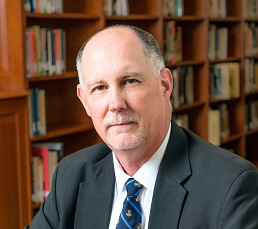*This article is part of In Public Safety’s September focus on career transitions*
By Ron Wallace, Ph.D., Associate Professor of Criminal Justice at American Military University
I’ve often joked that I did not choose criminal justice as a career path, it chose me. As a college graduate entering the workplace in 1982 my career choices were severely limited by the depressed economy. Midway through my undergrad years, the dynamic shifted from everyone who graduates with a college degree has a job waiting, to, well, good luck finding a job.

I spent my first year after graduation working a variety of odd jobs and constantly keeping my ears open for a professional job opportunity. My bachelor’s degree in American History and Political Science limited my options, but I kept looking for a position in government. Then one day, a friend told me about a probation/parole officer position. I applied and, in a few weeks I found myself working in criminal justice.
Phase 1: Getting My Feet Wet
That was the start of what I call Phase 1 of my professional career. For the next six-and-a-half years I worked as a probation/parole officer in two different counties. I then spent five years working as a parole case analyst with the North Carolina Parole Commission. The last year and a half in that role I was assigned to a special project to work with liaisons from different agencies to design a new offender management system for the department. That was my introduction to technology and opened the door to the next phase of my professional career.
Phase 2: Finding a Passion
Phase 2 began in 1995 when I was lured away from public service to work for a technology consulting firm. I was officially called a subject matter expert and suddenly agencies were willing to pay big dollars for the same advice I had been offering for free (and which was often rejected) as a government employee. I guess my opinion sounded better when it cost a lot of money.
I spent the next 17½ years working on technology engagements with a variety of criminal justice agencies nationwide. That all culminated when I landed a role as the manager of a team that was responsible for the business process improvement, organizational change management, and user training associated with the implementation of an automated offender management system for the California Department of Corrections.
[Read Dr. Wallace’s Article: Preparing Correctional Agencies for Technological Changes]
In the early 2000s, my wife encouraged me to go back to school and pursue a master’s degree despite my earlier promises to myself that the only courses I would ever take after finishing my bachelor’s degree were woodworking courses. After a lot of hard work, long hours, and challenges to balance work, school, and my personal life, I finished my MBA degree through an online program in 2005 and thought that would be it.
A downturn in the economy in 2007 resulted in tightening agency budgets and fewer criminal justice consulting engagements. My wife was working as an online educator in nursing. I had more years of experience in criminal justice than she did in nursing, so I figured I should get some extra work teaching.
I contacted numerous universities and was told that, despite my wealth of knowledge from working in criminal justice, my lack of education in the field prevented me from teaching. That’s when I decided to go back to school and get a degree in criminal justice; I decided to go for a doctoral degree.
I was about halfway through my Ph.D. program when the California job became available. Not being one to quit something I started, I pushed on with my degree while at the same time taking on a job where it was not unusual for me to work 60+ hours per week.
I completed my doctoral degree in September 2011. I had earlier convinced one university to let me teach online, despite my lack of education in the field of criminal justice and found I really enjoyed the student interactions. That’s when the planning began for the next phase of my professional career.
By September 2012, I had lined up enough work to safely leave the world of consulting and start teaching as a full-time career. My years of experience in criminal justice plus my Ph.D. degree made me much more attractive to educational institutions. That began Phase 3 of my professional career.
Phase 3: Teaching
While I had many wonderful experiences during my years working in criminal justice and later as a consultant, I find my interactions with students to be the most rewarding. I love hearing about student experiences and applying my war stories to the subjects we are discussing.
Teaching has proven to be the best part of my professional career. And, in case you were wondering, I have still not taken that woodworking course yet. But one day I will, you can bet on that.
About the Author: Dr. Ron Wallace is a criminal justice professional with more than 30 years of experience in both the public and private sectors. He has worked with criminal justice agencies nationwide as a consultant on various projects and has several years of teaching experience at both the undergraduate and graduate levels. Dr. Wallace currently serves as an Associate Professor of Criminal Justice at American Public University System. He has conducted research and published articles on the topic of Intimate Partner Violence (IPV).
Comments are closed.